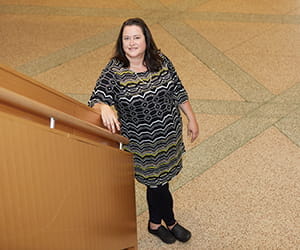
Dr. Laurel Walsh admits she’s followed a non-traditional career path over the past quarter-century—from high school teacher in the Czech Republic to doctoral candidate mentor in the American Midwest. But the core faculty member in The Richard W. Riley College of Education and Leadership wouldn’t have it any other way. In 2008, she answered an ad for an academic editor at Walden University, and over the past decade, she’s moved into leadership roles in the Writing Center, Office of Academic Support (formerly the Center for Student Success), and Center for Faculty Excellence. Currently serving as a faculty mentor for Doctor of Education candidates, Walsh says that as her titles have changed, her deep-rooted love for teaching has remained constant.
How did working with high school students translate to later working with adult learners?
When I returned to the United States, I really wanted to continue teaching the same demographic, so I taught at a community college. If I could instill comfort in new undergraduate students in writing down their thoughts and sharing them with a small group of peers, it could be a powerful opportunity to influence their academic journeys. When I came to Walden, I was a little worried that it would take me away from students who really needed a baseline comfort with academic writing. But I started to realize that my graduate students and doctoral candidates had the same struggles with more advanced composition. We might have subject-level mastery, but very few of us feel comfortable sharing our writing with others.
What is your favorite thing about working for Walden?
The diversity of experiences that I’ve had at Walden is unparalleled. I can’t imagine another professional backdrop where I’d have such a rich and diverse opportunity to do so many things. Before Walden, I taught for almost 2.5 years in a Master of Business Administration program in the College at St. Scholastica’s accelerated degree program. I knew even if I lived to be 1 million years old that I’d never be able to go beyond teaching management theory and American Psychological Association (APA) style and being a capstone advisor.
Of all your work at Walden, what do you feel has been most impactful?
In 2008 or 2009, we did an investigation of capstone quality. We looked at the final editorial suggestions that students received on their dissertations and looked side by side, page by page, at how those edits informed students’ choices in their final documents. We learned that students made very few fixes based on boilerplate cut-and-paste APA-rule edits and did a lot based on what we came to see as more of a conversation with the student. There was a faculty editor at the time who had 97% of his edits incorporated, so we wanted to know how he was doing that. We merged that into a set of best practices. That investigation all those years ago has informed the way I give feedback. When I’m mentoring other faculty and working in the classroom, I’m still using those insights.



